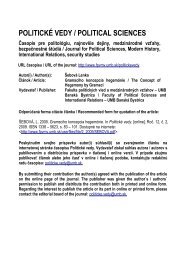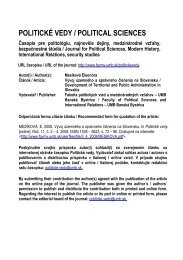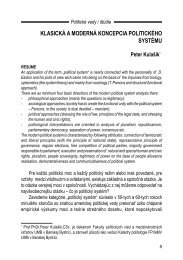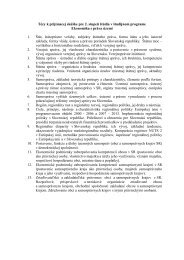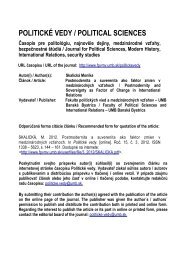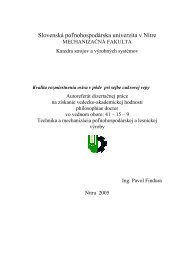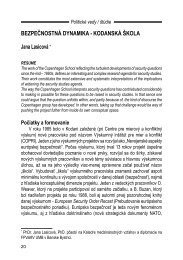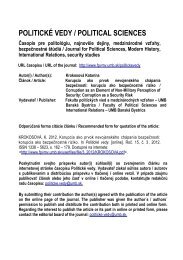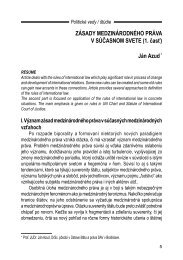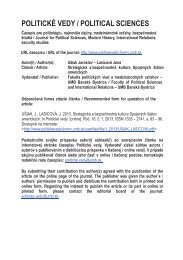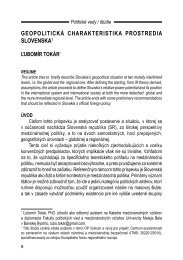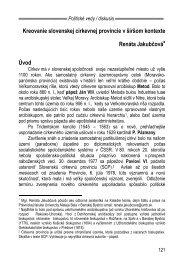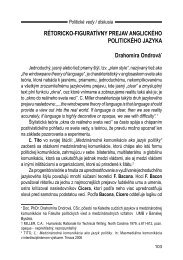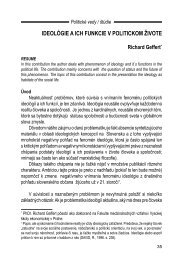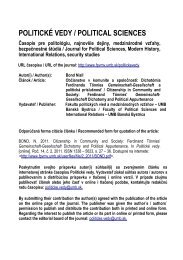MRAVNÃ VÃCHOVA V Å KOLÃCH NA SLOVENSKU A V ZAHRANI ÄÃ
MRAVNÃ VÃCHOVA V Å KOLÃCH NA SLOVENSKU A V ZAHRANI ÄÃ
MRAVNÃ VÃCHOVA V Å KOLÃCH NA SLOVENSKU A V ZAHRANI ÄÃ
Create successful ePaper yourself
Turn your PDF publications into a flip-book with our unique Google optimized e-Paper software.
1.3. Reflective kind of moral agent and his level of moral thinking<br />
These P4C and CI methods and experience can contribute to formation and development of moral<br />
thinking, not only of moral feeling and acting among children and youth, as it is implemented in the<br />
current model of ethical education. Secondary schools students are almost adult or they are adult<br />
young people and thus we should focus, as far as it is possible, on formation of mature moral agents<br />
capable of more demanding intellectual activity in form of moral reasoning and thinking<br />
corresponding with the reflective kind of moral agent. 1 I derive the definition of the reflective kind of<br />
moral agent from two primary sources: the psychological concept of personality kinds by Robin R.<br />
Vallacher and Daniel M. Wegner (1989) and the levels of moral thinking by Richard M. Hare (1981).<br />
In Vallacher and Wegner´s concept there are two kinds of agents: the low-level agent (LLA) primarily<br />
operating in the world on the level of details and the high-level agent (HLA) acting in terms of causal<br />
consequences, social meanings and self-descriptive implications. Given agent tries to control his<br />
actions considering the consequence. The HLA are people who manage to do much of their behaviour<br />
focusing on more significant aspects of their actions. On the contrary, the LLA often participate in<br />
activities, which they view as less significant. Furthermore, on the basis of empiric research the<br />
authors claim that the LLA are more impulsive, less motivated, and less consistent in their long term<br />
behaviour. The LLA consciously deal more with details of their actions. The HLA focus more on the<br />
meaning of their actions, which enables them to select personally the kind of action from the point of<br />
view of its significance given by its context. They are individuals who consider their actions in terms<br />
of consequences and implications. This enables consistency and stability of their actions in contrast to<br />
the LLA. The HLA incline less to opportunist criminal actions. One of the basic differences between<br />
the two kinds of the subject lies in the fact that in connection with their actions the LLA answer the<br />
question how, while the HLA answer the question why (Vallacher-Wegner, 1989, s. 660-671). 2<br />
Richard M. Hare primarily considers two levels of moral thinking: intuitive and critical. On the level<br />
of the intuitive thinking there are relatively simple principles of acting, when we learn to behave<br />
morally. He is of the opinion that although these relatively simple principles used on the level of<br />
intuitive thinking are desirable for human moral thinking, they are not sufficient. There is little<br />
probability that all aspects of a new situation will be similar to a previous situation and then it is<br />
questionable whether the differences are relevant for its moral or other assessment. If these differences<br />
are relevant, then the principles that we acquired in the past are not suitable for the new situation. Most<br />
frequently it is objected to the intuitive level of moral thinking that it is not capable of answering<br />
adequately to the conflict of the principles, i.e. it is not capable of solving more complicated moral<br />
issues. In such case, according to Hare, we need a non-intuitive way of thinking. Intuitions that cause<br />
the establishment of the conflict are products of our education and past experience. According to Hare,<br />
principles of the intuitive thinking are not sufficient and thus we should always ask whether the<br />
education based on these principles is the best we could get or whether the past decisions were right or<br />
whether the principles postulated on their basis could be correctly applied to a new situation. Critical<br />
thinking tries, according to him, to select the best net of “prima facie” principles for application in<br />
intuitive thinking. Except for this, the role of critical thinking is to solve the conflicts between these<br />
principles. It can lead to improvement of the principles, although it is not necessary, or it can replace a<br />
principle with another principle. The best net of principles is the one that accepts actions, dispositions<br />
etc. which are closest to those we should select, if we were able to apply critical thinking anytime.<br />
Hare expresses the difference between the intuitive and the critical level of moral thinking<br />
1 Reflective kind of moral agent speculates about the substance of moral principles, standards and values,<br />
postulates his own principles, values and standards, which do not have to be identical with the socially accepted<br />
ones, however, they cannot be in contradiction with the basic moral values, i.e. they have to respect and confirm<br />
humanity and dignity of a man and his moral right. Furthermore, one of the characteristic features of the second<br />
kind of moral agent is clear and logical thinking. Analytical thinking, which consists above all of the analysis of<br />
a real moral situation and the possibility to execute his own moral ideals and values, which in fact correspond<br />
with basic moral values and principles of human society, can be considered typical for his way of moral thinking<br />
(Gluchman, 1997, s. 32-94; 2005, s. 27-88).<br />
2 More on the analysis of the concept can be found in my work Človek a morálka (Gluchman, 1997, s. 105-106;<br />
2005, s. 99-101).<br />
287



